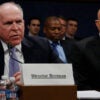Is the internet ready for the U.S. government to give up its longstanding role as the ultimate guarantor of internet governance? Yes, insists the Obama administration. The international community of stakeholders—users, businesses, engineers, and civil society groups—will remain firmly in control.
We’re skeptical. But before we tell you why, let’s make a few things clear. We support the multi-stakeholder model of internet governance. We do not believe any government should control or own the internet. We do not oppose the “transition”—the administration’s plan for stakeholders to assume current U.S. oversight responsibilities over the internet’s domain system. But we do oppose rushing the transition before critical questions are resolved. We recommend extending the contract for a year or two to vet the proposal and complete all of the reforms sought by the community.
Administration officials have stated repeatedly that “it is more important to get this issue right than it is to simply get it done.” But with only five months left to govern, it’s become clear that the Obama administration is most concerned with the president’s legacy and making the most of his last months. He doesn’t sweat the details—or the Constitution. Serious concerns surrounding the transition remain unresolved as the administration seems dead set on moving forward, regardless of the potential consequences.
The transition started in March 2014. The Commerce Department’s National Telecommunications and Information Administration (NTIA) announced that it intended to end the contractual relationship over the technical heart of the internet between the U.S. government and the Internet Corporation for Assigned Names and Numbers (ICANN).
The contract required NTIA to sign off on changes to the authoritative root zone file and the Internet Assigned Numbers Authority (IANA) functions, which tie together the Domain Name System—the internet’s phone book. NTIA’s role meant the DNS could not be hijacked: the U.S. government was the ultimate guarantor of freedom on the network.
ICANN, a California nonprofit corporation, was created in 1998 as a technical coordinating body, but has acquired increasingly quasi-governmental powers to regulate, tax, and spend.
The U.S. has largely kept a hands-off approach to ICANN, but the mere possibility that NTIA might award the IANA contract to some other organization has helped check ICANN and make sure it did not stray beyond its narrow mission or abuse its position. Indeed, NTIA used that threat effectively back in 2012, when it solicited bids for the IANA contract.
But that was before Edward Snowden dramatically changed the dynamic in June 2013. For years, the U.S. had worked with like-minded countries to resist efforts to have the U.N.’s International Telecommunication Union assume a role in internet governance, but feared that some of its allies might change their position after the extent of American surveillance was made public.
Even though the U.S. relationship with ICANN had nothing to do with that surveillance, the U.S. saw an opportunity to change the discussion prior to the April 2014 NETMundial conference in Brazil. In March 2014, NTIA announced that it would soon end its its contractual relationship with ICANN and move that oversight role to the multi-stakeholder community.
Over the past two years, a ton of work has gone into a proposal for ICANN to fulfill its responsibilities without NTIA oversight and empower the community to hold an autonomous ICANN accountable. But its leadership knew that, for all the lofty talk about reform, the administration had already committed itself to completing the transition.
In addition, much of the multi-stakeholder community was eager to complete the process before the election, because a new administration might not support the transition.
ICANN’s leadership held the real leverage. All it needed to do was to run down the clock—and put together reforms that looked just good enough to satisfy the White House and the community. And that is precisely—and very predictably—what happened.
In June, NTIA released a lengthy report concluding that the proposal met its criteria for the transition laid out in March 2014. On August 16, NTIA informed ICANN that it intended to allow the contract to expire on Sept. 30.
In doing so, the administration has brushed off concerns about the transition. At the Internet Governance Forum in Washington, D.C., this past July, Assistant Secretary Lawrence Strickling of the NTIA responded to some concerns, but offered little substance about many.
He breezily concluded: “Other claims keep popping up and I do not have time today to correct every misstatement being made about the transition.” In truth, the points he so quickly dismissed are not “claims” or “misstatements,” they are unresolved concerns and unanswered questions.
Here are the most urgent concerns—and why they matter.
- Whatever happens with the transition, there’s no reason whatsoever to think authoritarian countries like Russia and China won’t try to exert greater control over the internet and the long-term impact of the transition on positions of other governments vis-à-vis U.N. governance of the internet are unknown.
- It is unclear at best whether the multi-stakeholder community has the cohesion and resolve necessary to serve as an effective check on the ICANN board post-transition.
- Governments will have more power post-transition than they do currently, and it is unclear how this will affect ICANN.
- Recent events revealed that ICANN has serious transparency and governance problems, which could make it vulnerable to corruption and abuse.
- The U.S. government’s role is a major reason why the ICANN board has been willing to accept accountability measures, because the transition is dependent on their adoption. But a number of important additional reforms will not be completed until after the transition, and failing to extend the contract may jeopardize their implementation.
- Substantial questions on ICANN’s jurisdiction—including where ICANN will be headquartered and incorporated and to which laws ICANN will be subject—remain unanswered.
- The U.S. failed to secure legal ownership and control of the .mil and .gov domains, which could create national security concerns in the future.
- The new ICANN bylaws may not be in line with California law, which could lead to legal and political challenges.
- If the transition involves a transfer of property, ending the contract without congressional authorization would violate the Constitution.
- NTIA may have violated a funding prohibition if it fails to extend the contract.
- It is unclear that U.S. antitrust law will actually be an effective remedy (or deterrent) against anti-competitive behavior by ICANN, even the transition doesn’t change its legal status. Yet foreign antitrust laws could be used strategically to portray ICANN as a cartel, and thus make the case for a shift to U.N. control.
- NTIA may have violated administrative law by failing to adequately consider public comments on the transition directly, and instead relying on ICANN to do so on its behalf.
For those interested in more details about these concerns, an expanded version is available here.
By calling for an extension, we are not questioning the continued need for multi-stakeholder governance. Quite the opposite. We worry that approving the transition prematurely will set the multi-stakeholder model up to fail.
We fear that governments will gain new influence over the internet, that its freedom will suffer, and that the ICANN leadership (CEO and staff) will continue its troubling pattern of ignoring its bylaws without the community holding leadership accountable.
Absent intervention by Congress or U.S. courts, the contractual relationship between the U.S. government and ICANN will cease at the end of September. The outstanding concerns and questions above lead us to recommend a “test drive” period to:
- Resolve these legal questions,
- verify that the new system works as expected, and
- to allow for the full implementation of the pending accountability and transparency measures.
For the test drive to actually work, NTIA would indeed have to “transition” out of its current role in approving final changes to the root zone file. But NTIA can do that while also retaining the authority to reassert its oversight role and preserving what has always been its most fundamental check on ICANN: the ability to rebid the contract. In short, we recommend a partial transition now.
Many in the ICANN community share some of our concerns or have misgivings about various details of the proposal. Yet, they’ve been convinced by U.S. political commentators that if the transition does not happen now, it will never happen.
Hillary Clinton has indicated that she supports the transition. We are not aware of Donald Trump having expressed a position regarding the transition, but we note that the Republican Party platform opposes it. In any case, the current contract will end in 2019. After 2019, continued U.S. oversight would require a new contract, which ICANN would have to be persuaded to accept.
If the multi-stakeholder community and most of the world is happy with ICANN and support its continuing role absent U.S. oversight, the U.S. won’t be able to compel ICANN to sign a new contract.
In other words, if ICANN fulfills its promises to the community on accountability and performs its responsibilities well, ICANN will have the independence it desires by 2019 at the latest. But the intervening time could be invaluable in vetting this proposal, finishing incomplete reforms, and resolving outstanding legal concerns.
The internet as we know it is only 20 years old. Isn’t its future worth a bit of time to get this right?






























